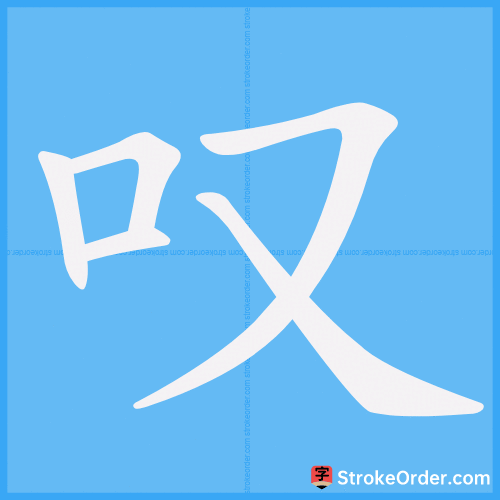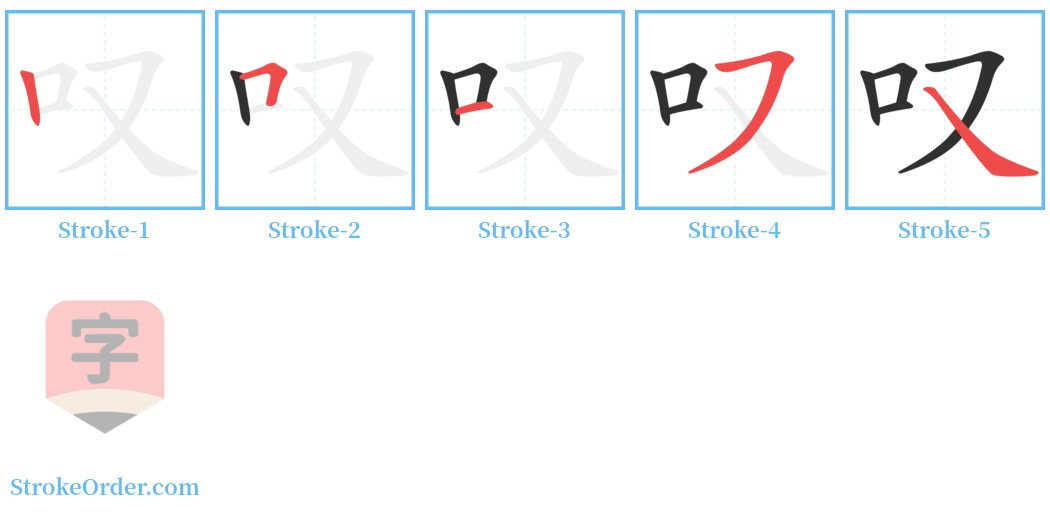叹 Stroke Order
Animated Stroke Order of 叹

Stroke Order Diagrams for 叹

Step-by-Step Handwriting Guide for 叹

Learn to Write Chinese Characters with Video Tutorials
Watch the video of writing the Chinese character "叹", learn the correct stroke order (笔顺) of the character "叹", and master the standard way of writing the character "叹".
Free Printable Handwriting Practice with Stroke Order: 叹
Printable Writing Practice Worksheet of "叹" in Portrait Orientation (Tian Zi Ge)

Printable Writing Practice Worksheet of "叹" in Landscape Orientation (Tian Zi Ge)

Information of 叹
Pinyin
tàn
Radical
口
Strokes
5 strokes
Usage
★★★★★
Definition
to sigh
叹
tàn
〈动〉
【本义】:叹息
1. To exhale a long breath due to worry, sadness, or pain.
Examples: 叹气 (sigh); 叹息 (sigh); 悲叹 (lament); 叹惋 (sigh with regret); 长吁短叹 (sigh repeatedly).
2. To release a long sound due to happiness, excitement, or agitation.
Examples: 叹赏 (praise); 叹服 (admire); 赞叹 (highly praise); 叹观止矣 (to praise something to the utmost).
3. To chant or recite.
Examples: 咏叹 (to chant); 一唱三叹 (a sing-and-sigh expression).
引
1. 从《说文》: 叹,吞叹也。一曰太息也 (From "Shuowen Jiezi": to sigh, which can also mean to take a deep breath).
2. 禽子再拜而叹 (From "Mozi": the bird bowed twice and sighed).
3. 戏而不叹 (From "Liji": to play but not sigh).
4. 望洋向若而叹 (From "Zhuangzi": to gaze at the vast ocean and sigh).
5. 皆叹惋 (From Jin Dynasty author Tao Yuanming's "Peach Blossom Spring": all sighed with regret).
6. 默叹曰 (From Ming Dynasty author Liu Ji's "Yuli Zi": silently sighed and said).
7. 婉贞微叹曰 (From Qing Dynasty author Xu Ke's "Qing Bai Lei Chao": Wan Zhen sighed softly).
8. 叹借者之用 (From Qing Dynasty author Yuan Mei's "Huang Sheng Jian Shu Shuo": sigh regarding the use of borrowed items).
例
又如:
叹气嗐声 (to sigh and moan);
叹恨 (to sigh with regret);
叹憾 (to sigh with remorse);
叹笑 (to scoff and sigh);
叹悔 (to sigh with regret);
叹喟 (to sigh deeply);
叹嗟 (to sigh);
叹想 (to sigh in reminiscence);
叹诧 (to sigh in astonishment);
长叹 (to take a long sigh);
叹一口气 (to exhale a breath).
2. 赞叹,赞美 ([En.] highly praise)
引
1. 默叹 (From "Yu Chu Xin Zhi": to sigh silently).
2. 亟叹其技 (From Qing Dynasty author Xue Fucheng's "Guan Baji Oil Painting Record": to urgently praise their skill).
例
又如:
叹重 (to highly respect and praise);
叹奖 (to commend and reward);
叹嘻 (to exclaim in praise);
叹骇 (to express astonishment and praise);
叹为观止 (to praise to a remarkable degree);
叹异 (to be astonished and praise).
3. 吟诵 ([En.] chant)
引
1. 叹,吟也 (From "Shuowen": to chant).
2. 智勇盖当代,弛张使我叹 (From "Wenxuan": may wisdom and strength be equally revered in this time, they make me sigh).
3. 一唱而三叹 (From "Liji": to chant and then sigh three times).
例
又如:
叹诵 (to chant).
Input Method for 叹
Pinyin
tan4
Wubi
kcy
Cangjie
re
Zhengma
jxs
Four Corner
67040
Unicode
U+53f9
Same Pronunciation Characters